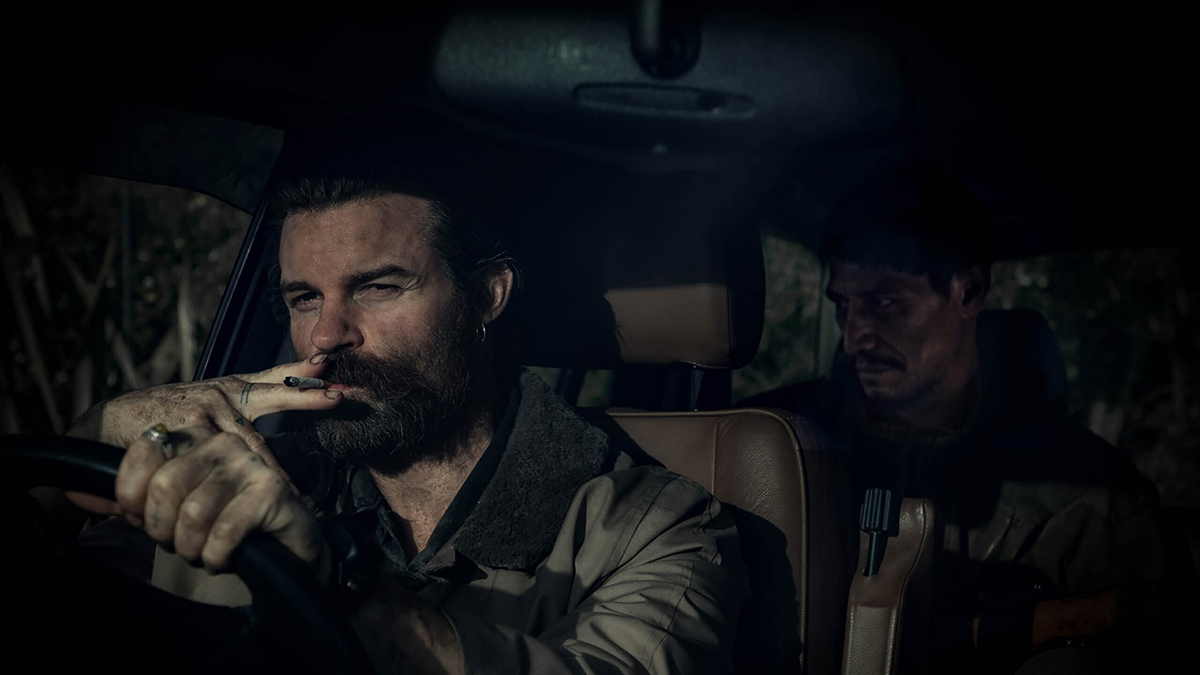
It feels like there is constant chatter online about the decline of the horror genre. Yet, for every hollow remake and safe studio engineered big-budget vehicle, there is a wealth of captivating and impressive features trickling through if you go looking for them. Just within the last five to six years, I’m consistently amazed at the number of first-time directors that have come out of the gate at full speed making a huge impact with just a single film. Actor turned director James Ashcroft joins that list with his debut feature Coming Home in the Dark. This New Zealand thriller expertly blends the essence of a road movie with the stylistic elements of a home invasion film to create something that exceeds the usual limitations of each respective genre.
Adapting a short story by award-winning New Zealand author Owen Marshall, we follow a family of four out on a road trip enjoying the scenic views. However, while stopped for a picnic the group becomes waylaid and abducted by two drifters plunging them into out and out chaos forcing them along on a brutal road trip that forces them, along with the viewers, to face some very uncomfortable truths. The adaptation of the story to screenplay was handled by Ashcroft himself along with Eli Kent. Notably, both starred together in the 2006 horror comedy Black Sheep.
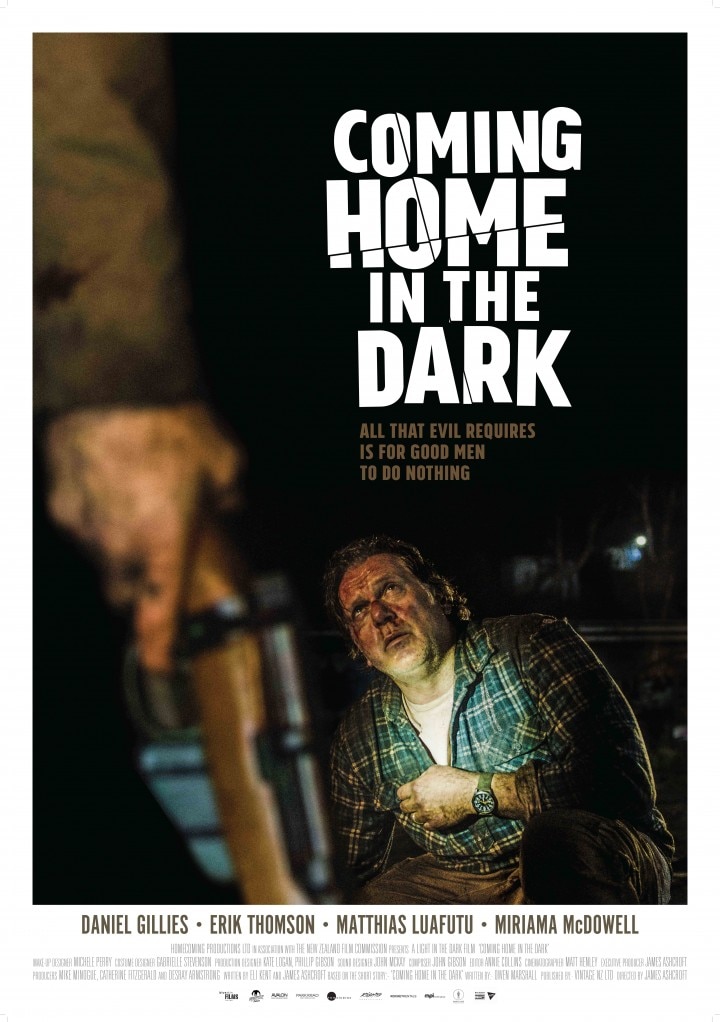
This is not a film for the faint of heart. Coming Home in the Dark is exceedingly bleak in tone and it pulls no punches depicting the unrestrained cruelty found with its killers. If you are hesitant to watch home invasion films or struggle with heavy doses of emotional despair then use your own judgment before subjecting yourself to this one. Plenty of people have a hang-up with these types of films and usually, that rests on the idea that the horrors here are very real and wind up being the kind of things that have happened before and likely will happen again at some point.
There is a power in confronting such uncomfortable truths, but it’s not for everyone and there is nothing wrong with knowing your own limits when it comes to your personal horror-watching experience. But for those willing to give it a shot, where this film shines, perhaps greater than its contemporaries in this sub-genre, is that it confronts viewers with something of a complex moral quandary along with the usual realistic presentation of violence. This is a film where it is hard to root for anyone and I believe it pushes the question of whether you can sympathize with its antagonists in any way or if a scenario can ever exist which can justify their actions.
The film opens with some gorgeous wide shots of the New Zealand countryside. The winding roads of a lonely highway are underscored by an excellently moody and atmospheric score. We get the hint of something wrong with a scene depicting a car that has run off the road, its door open and squeaking as it shakes back and forth in the wind. Driving along this highway we are introduced to a typical family on a road trip: Alan (Erik Thomson), also known by the nickname Hoaggie, his wife Jill (Miriama McDowell), and their two sons Jordan (Frankie Paratene) and Maika (Billy Paratene).
Though this segment of the film is brief, in just a handful of scenes the family is set up well and humanized. We see the teens arguing about music. You get the feel of the monotony of a long road trip. It’s clear Alan and Jill have a lot of love for one another, but still get a little annoyed after being cooped up on the road for so long. Alan even caps off the road trip clichés by trying to get everyone to start singing “100 bottles of beer” together. Yet, when they arrive at their destination and take a short trek up to a scenic point to have a family picnic you can see the genuine love and affection in their reactions to one another. This is all well done and I considered it particularly important because it makes you care just enough that the rest of the movie can become the powerful emotional gut punch that it is.
During their picnic, the family is approached by two strangers: the sinisterly charismatic Mandrake (Daniel Gillies) and his more stoic, often silent partner Tubs (Matthias Luafutu). There’s a great shot of them off in the distance waving to the family as they hike up the hill ahead of the picnic. Yet, it is alarming just how fast they come onto the scene and take control, initially drifting by and making small talk before raiding their food while Mandrake starts loading a rifle. The parents rightfully caution their children to be compliant hoping that they’ll just be robbed and left alone, but Mandrake makes it clear that things won’t be so easy.
The tension gets stretched to the max as he taunts them about how remote the area they are in is. Amid this initial chaos, things get interrupted by an SUV pulling up nearby prompting Mandrake to coach the family through acting as if nothing is wrong. While the vehicle heads away on its own business Mandrake points out to the family that when they look back on this day, that will be the moment where they will wish they had done something. Something should be said for Gillies performance as Mandrake. While the duo seems to just be seedy drifters in appearance, Mandrake comes across as surprisingly charismatic and thoughtful. When Alan questions how odd his name is, Mandrake is able to quip happily, “I’m a magician, I make things disappear.”
It is hard to put into words just how well-paced this entire scene is. The tension is almost unbearable and yet through it all Mandrake is able to shoot off jokes like he’s some jovial drunk in the back of a pub somewhere. I’ll avoid major spoilers like character death, but when things finally escalate it is stunning just how brutal and cold Mandrake can be one moment, and then the next second you find him cheerfully asking whether the family brought any beer they can raid. As much as you want to hate him, it is hard not to love him on performance alone.
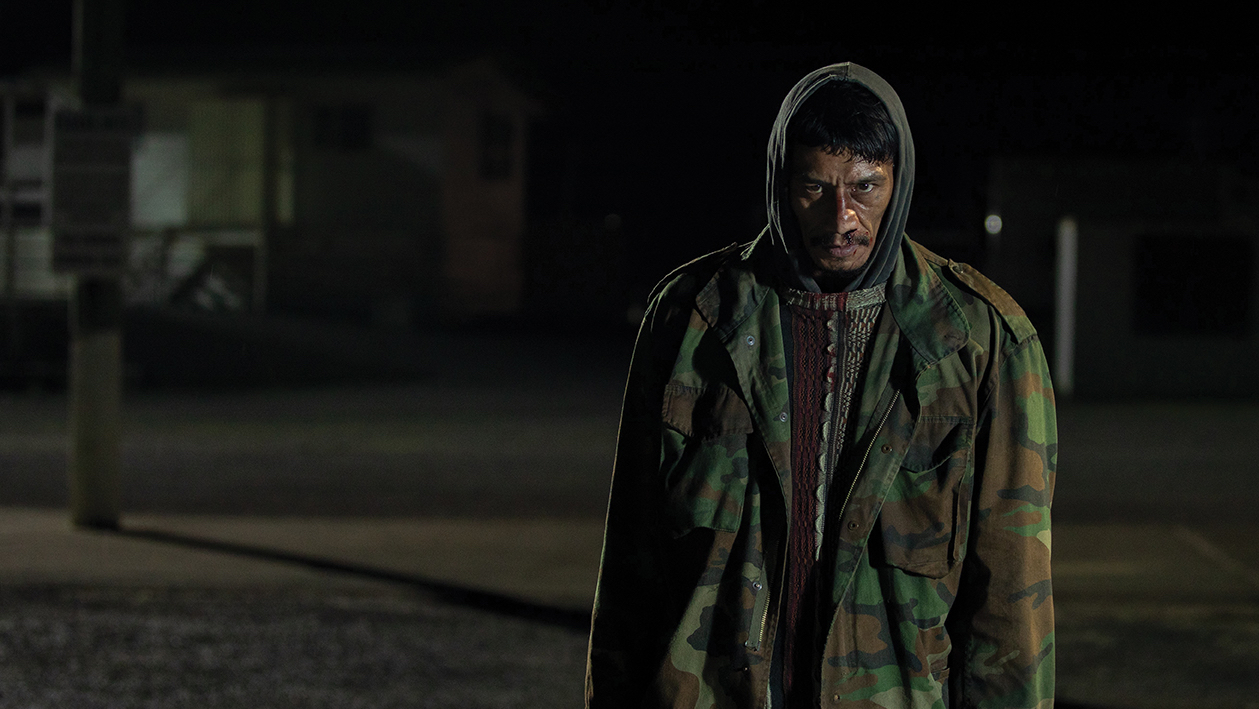
Much of the rest of the film is devoted to a late-night joyride with Mandrake at the wheel and the family drug along at his whim. While Tubs remains mostly silent, content to follow whatever his partner commands, Mandrake has a constant need for conversation even going so far as to entreat the rest to play “I spy” with him to pass the time. This ends up creating a sort of sick inverted retake of the opening scene of the film. All this is segmented, like any true road movie, with plenty of driving scenes. The night shots with the camera held tight just over the hood as they drive along a rural road play super effectively backed with the ominous score.
Yet, it is during these conversations that things take an interesting turn. This is the one spoiler I will get into because its inclusion in the mix opens up a gateway to interesting concepts so if you want to go in completely blind and are interested thus far I entreat you to go ahead and give it a chance. During their conversations there starts to be a hint that the drifters might be more familiar with Alan than it initially seemed. Mandrake talks about Alan being a school teacher despite never learning that fact and he eventually forces him to walk back through his work history. Eventually, they reach what he is fishing for as Alan admits that many years ago one of his earliest jobs was at a boy’s home. The facility is infamous because it suffered a large-scale controversial scandal regarding abuse perpetrated on the kids by staff members.
Alan is quick to dismiss the event saying he was just there for training and never saw anything, but later in the film after a bit more escalation and pressure, he admits to witnessing the abuse explaining that he merely stood to the side and did nothing allowing it to happen. It is this revelation that recasts a lot of the film. Alan is not the altruistic leading man that we initially believe him to be. Mandrake is not quite the chaotic fueled rampage killer as first presented. It may still be wrong, but there is a heavy motivation behind their actions. When Mandrake desires Jill’s feelings about this revelation she delivers a line that hits so emotionally hard that you’re sure to remember it after the credits roll. She admits that she always sensed Alan had been hiding something. She then states that there is a big difference between doing something bad and just letting it happen but they live on the same street.
The story is written well enough to avoid making a saint out of anyone. Mandrake is still a terrible person and he goes through the film executing people with an ease that few could ever naturally stomach. Tubs is perhaps the most interesting of all. He rarely speaks and at times Alan and Jill even reach out to him suspecting that he is maybe forced along by Mandrake’s will. Yet in the final moments of the film, we’re shown another side to him that raises more questions still. The film presents a bleak world where nobody is the hero and I think it dares the audience to question their feelings and whether they can sympathize at all with the killers. It never offers an answer, however, merely presenting the idea to be wrestled with. I think the film wants viewers to feel divided over the characters in the film and their situation. To ponder if there is ever a scenario that might justify the brutality you are seeing on screen.
It s a difficult question to be sure as true crime fans know all too well. Discussing the making of a serial killer goes well beyond this review, but the debate between nature and nurture as a founding element is a regular topic. Is there something naturally dark and sinister within such people that leave them fated to kill? Or are they a product of their environment born from childhood trauma and other abuse? The answer might lie somewhere between, but it is a conversation that is still ongoing. Mandrake and Tubs fit nicely into the mold of several famous serial killer duos like Leonard Lake and Charles Ng. Perhaps the most readily available comparison is with fellow drifters Henry Lee Lucas and Otis Toole whose chilling spree has been immortalized in the 1986 film Henry: Portrait of a Serial Killer.
The film itself hits most pointedly at this question when Mandrake decides that he wants to talk about the literary classic Frankenstein by Mary Shelley. Alan is quick to cut him off having grown too weary with despair to keep humoring him and guesses that Mandrake identifies with the monster scolding him by saying that he misunderstood the story. Relating it to their own situation, Alan distances himself from Victor Frankenstein stating that he was not the one who created what Mandrake is now. Mandrake never offers a retort but I think it tells us a lot more about Alan that he jumped towards calling Frankenstein’s creation a “monster” first and foremost.
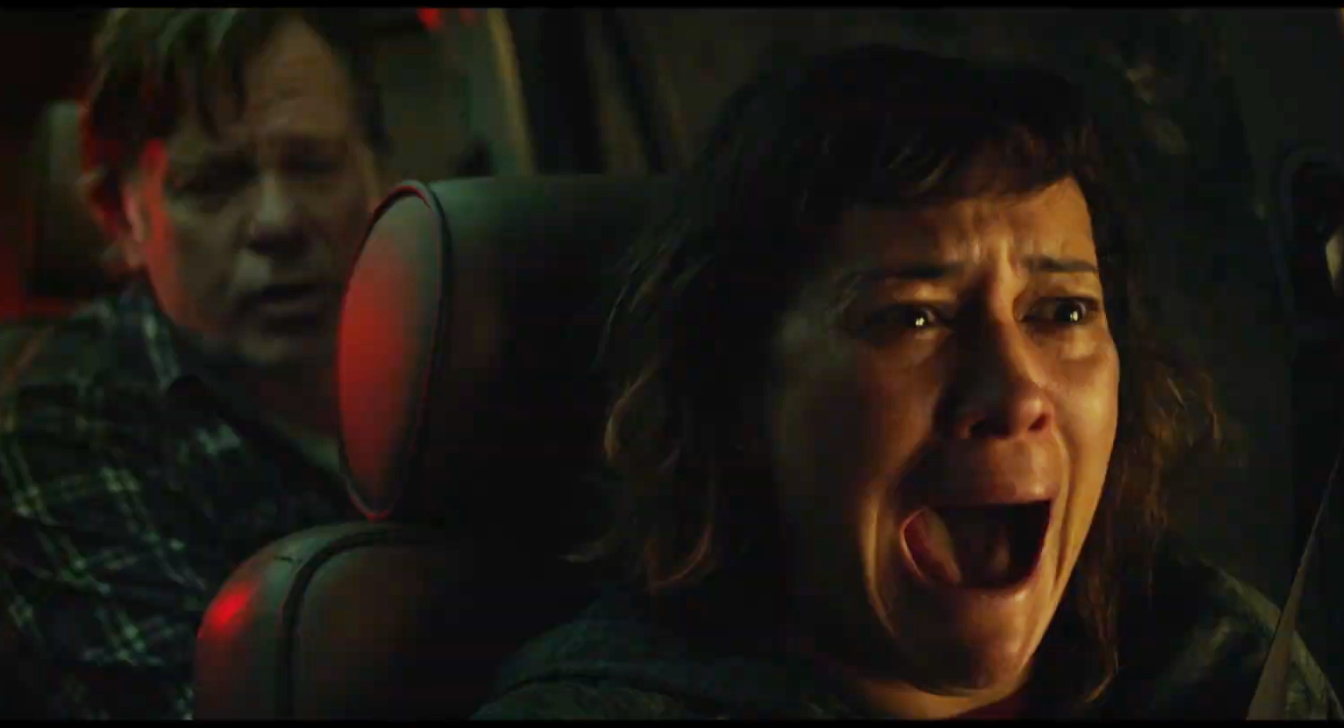
I also appreciated that the film avoids falling into any of the usual played-out tropes of the home invasion film. Coming Home in the Dark allows its protagonists to be smart and actually quite clever at times in their attempts to escape their situation. There’s a lot of good early set up and pay off with a few different elements. Alan makes some bold moves at times to create the opportunity to escape. It never felt like they had just given up or were so bumbling that they were tripping over themselves rather than making any progress. But the film stays true to its grim reality and also avoids any sort of cliche twist where a character might escape and then come back to save the day. The story is what it is, one bad night that likely only happened by chance.
It is these sorts of concepts that elevate Coming Home in the Dark well above its peers. Seeking a meaning to it all, Alan tries to map out the reality of their situation surmising that the duo must have been searching for him and others from the staff seeking their revenge one by one. Mandrake is quick to correct him, however, explaining that they were simply the next mark in a long line. The last jacked car had broken down and their family was just the next option that came along. The fact they had this shared history wound up being nothing more than a happy accident. The most sinister part of this answer is that Mandrake is such a skilled equivocator that you can never really be sure if this is actually the truth or just another story.
For a first-time directorial feature, this is an incredibly powerful thriller that is sure to keep you on the edge of your seat with a plot that’s going to sit with you whether you want it to or not. The director’s own statement on the film asked viewers to reflect on themselves adding, “We need to understand our own brutality if we’re to make any notion of change to society.” It’s a powerful thought and the film forces you to confront the idea by depicting the very worst in the world without glitzing it up with Hollywood magic or a satisfying resolution. For those that can stomach its brutal reality, Coming Home in the Dark is without a doubt must-see material.
Coming Home in the Dark was screened as part of the Fantasia Film Festival. The festival runs virtually from Aug. 5 – 25, 2021.
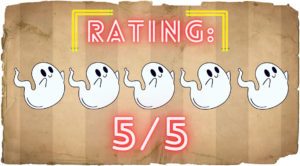
More from Fantasia Festival:
The Killing Cell falls into familiar tropes and beats of the found-footage genre. Notably, the plot sees a group of friends/paranormal investigators head to an abandoned facility, only to find…
Buffet Libre marks the third feature film from actor/director Zoe Berriatúa, and his first dive into more macabre subject matter. Here, the story follows an older Chinese couple, Xian (Yan…
We meet Elena, a “gajin” with a British father and Japanese mother, at her lowest, in a hospital bed after an implied attempt at taking her own life, or self-harm…
Sorority Babes in the Slimeball Bowl-O-Rama (also known as The Imp in the UK) is a 1988 American B-movie horror comedy written by Sergi Hasenecz, directed by David DeCoteau, and…
After stepping away from filmmaking since 2019’s charming musical comedy Dance with Me, director Shinobu Yaguchi makes his return with Dollhouse (2025), a horror tale centered on a cursed doll,…
THE CHILLING FOUND FOOTAGE HORROR FROM CHRIS STUCKMANN AVAILABLE ON DVD, BLU-RAY & DIGITAL FROM 15TH DECEMBER In Shelby Oaks a woman’s desperate search for her long-lost sister falls into…
*I feel the need to add to this article the fact that I was engaged as a freelance contributor to the film’s post-production team, specifically responsible for creating the end…
Why are horror and exploitation films so popular? Why do fans willingly submit themselves to the gruelling, torturous experiences that these genres provide? The simple answer is it feels good…
Nicolas Cage, FKA twigs & Noah Jupe deliver us from evil in ‘Jesus horror’ Altitude will release biblical horror The Carpenter’s Son in UK and Irish cinemas on 21st November. A…
Some horror games want to scare you. Look Outside wants to crawl under your skin, settle in, and remind you of just how fragile you are — and it succeeds…
Dustin is a potentially overqualified office worker who has a lifelong love and fascination with Japan and all things Horror. With a bachelor’s in English Literature and a master’s in Library Science, he devotes way too much time to researching and thinking critically about the media he enjoys. When not celebrating trashy horror films, anime, and idol music, he can be found raving about all things genre cinema as a co-host on Genre Exposure: A Film Podcast or indulging a passion for storytelling through tabletop roleplaying games.